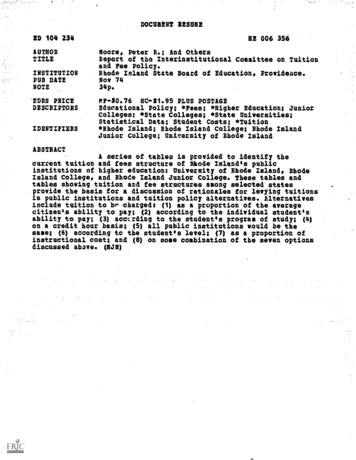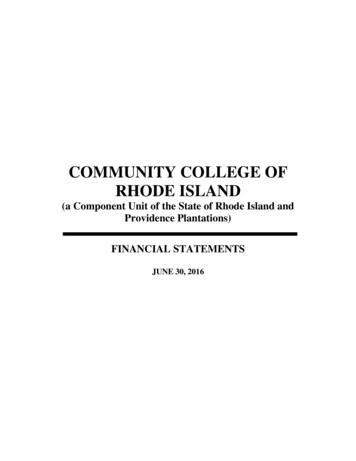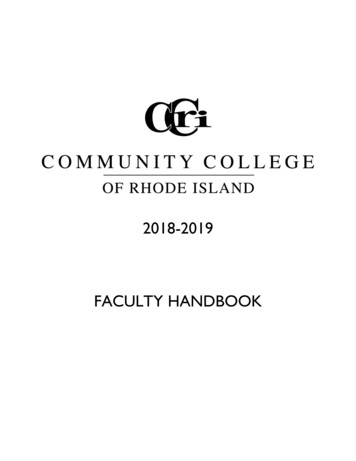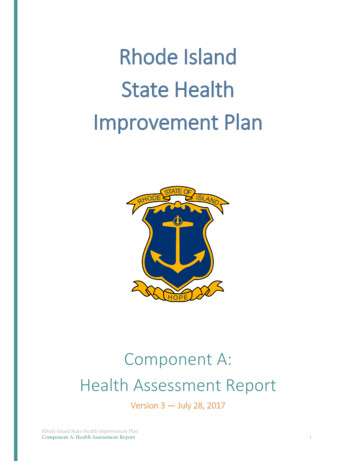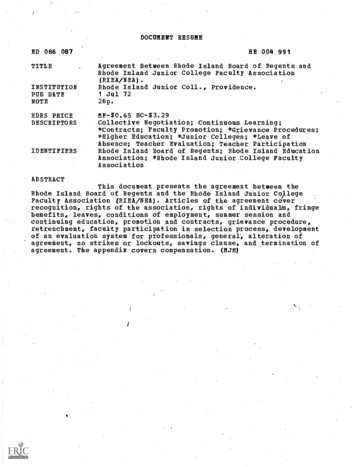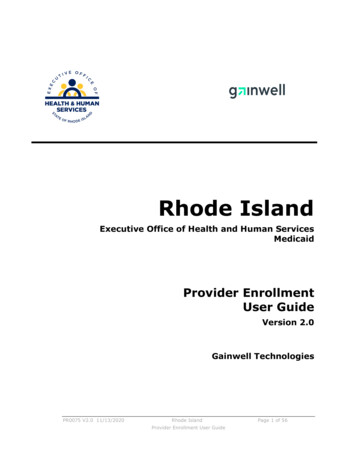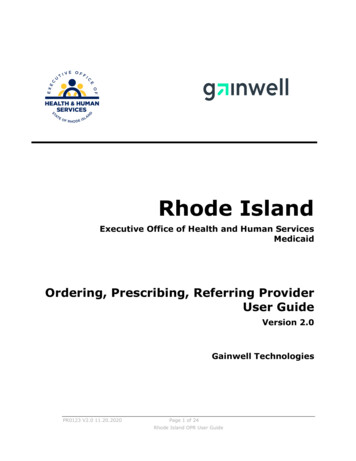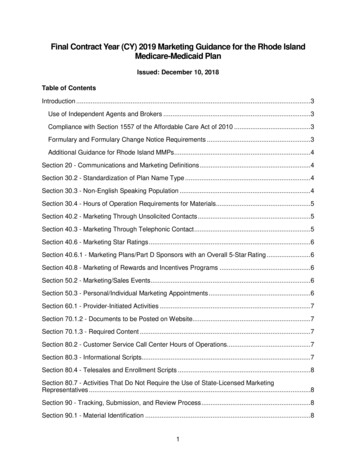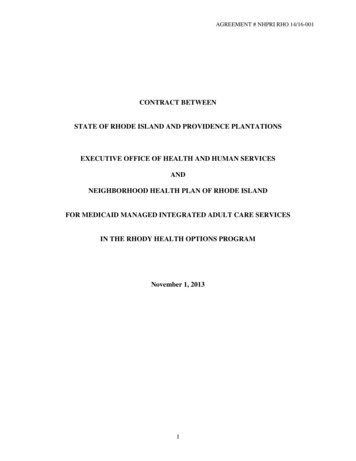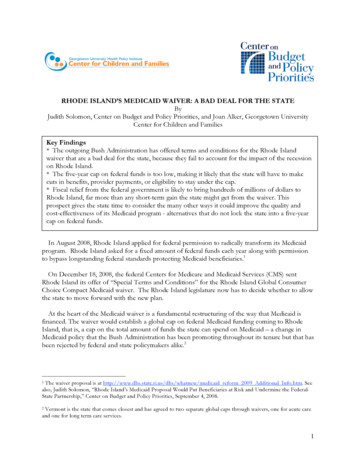
Transcription
RHODE ISLAND’S MEDICAID WAIVER: A BAD DEAL FOR THE STATEByJudith Solomon, Center on Budget and Policy Priorities, and Joan Alker, Georgetown UniversityCenter for Children and FamiliesKey Findings* The outgoing Bush Administration has offered terms and conditions for the Rhode Islandwaiver that are a bad deal for the state, because they fail to account for the impact of the recessionon Rhode Island.* The five-year cap on federal funds is too low, making it likely that the state will have to makecuts in benefits, provider payments, or eligibility to stay under the cap.* Fiscal relief from the federal government is likely to bring hundreds of millions of dollars toRhode Island, far more than any short-term gain the state might get from the waiver. Thisprospect gives the state time to consider the many other ways it could improve the quality andcost-effectiveness of its Medicaid program - alternatives that do not lock the state into a five-yearcap on federal funds.In August 2008, Rhode Island applied for federal permission to radically transform its Medicaidprogram. Rhode Island asked for a fixed amount of federal funds each year along with permissionto bypass longstanding federal standards protecting Medicaid beneficiaries.1On December 18, 2008, the federal Centers for Medicare and Medicaid Services (CMS) sentRhode Island its offer of “Special Terms and Conditions” for the Rhode Island Global ConsumerChoice Compact Medicaid waiver. The Rhode Island legislature now has to decide whether to allowthe state to move forward with the new plan.At the heart of the Medicaid waiver is a fundamental restructuring of the way that Medicaid isfinanced. The waiver would establish a global cap on federal Medicaid funding coming to RhodeIsland, that is, a cap on the total amount of funds the state can spend on Medicaid – a change inMedicaid policy that the Bush Administration has been promoting throughout its tenure but that hasbeen rejected by federal and state policymakers alike.2The waiver proposal is at http://www.dhs.state.ri.us/dhs/whatnew/medicaid reform 2009 Additional Info.htm. Seealso, Judith Solomon, “Rhode Island’s Medicaid Proposal Would Put Beneficiaries at Risk and Undermine the FederalState Partnership,” Center on Budget and Policy Priorities, September 4, 2008.1Vermont is the state that comes closest and has agreed to two separate global caps through waivers, one for acute careand one for long term care services.21
Most Medicaid waivers, such as the Massachusetts health reform waiver, include a per capita capwhich puts the state at risk for unanticipated increases in health care costs but not for higher thanexpected increases in enrollment. For example, if enrollment increases in Massachusetts morequickly than the state expects, Massachusetts still receives federal funds for all beneficiaries. Iflegislators approve the terms and conditions offered to Rhode Island, the state would be at risk forboth increased health costs and increased enrollment. Any unanticipated cost increases would haveto be paid wholly by the state or the program would have to be cut to fit within the cap. RhodeIsland would become the only state to operate virtually its entire Medicaid program under a globalcap. 3Capping federal funds for Medicaid presents risks for states, beneficiaries and health careproviders under any circumstances, but accepting a global cap on federal funds during a recession isespecially unwise. Medicaid’s matching funding system is designed to provide each state withflexible federal support to meet the health care needs of its most vulnerable residents. Theguarantee that federal funds will match a certain percentage of state spending allows states to coverunexpected increases in Medicaid costs resulting from an economic downturn, a new disease orepidemic, new drugs or medical technology, or other factors that are beyond the control of a smallstate like Rhode Island.The December offer does not reflect worsening economic circumstances. Significantchanges in both the Rhode Island and national economy have occurred since Rhode Island firstannounced its plan in April 2008. The state is now forecasting a steeper and longer lasting increasein unemployment, which will result in increased need for Medicaid by children and families. RhodeIsland is also predicting that an increasing number of Rhode Island seniors will need Medicaidbecause of depletion of their retirement accounts and other assets. Yet the Governor has agreed toa final offer from CMS that fails to take these trends into account.It would be especially short-sighted to accept a cap on federal funds given that RhodeIsland will likely get significant fiscal relief from the federal government in the forthcomingeconomic stimulus legislation. Rhode Island is not alone in dealing with increased demand forMedicaid at the same time its revenues are falling. Caseloads are beginning to rise in many states, asthey have in previous recessions. For example, Medicaid enrollment nationally among children andadults grew at a 10.2 percent annual rate during the last recession (between federal fiscal years 2001and 2004).4Over the coming weeks, Congress is likely to enact a temporary increase in the Federal MatchingAssistance Percentage (FMAP) for Medicaid as part of the economic stimulus package. Thelikelihood of significant fiscal relief from the federal government is also a change in circumstancesthat needs to be considered by the legislature as it considers whether to authorize the waiver. Thebenefits the state will get from fiscal relief will be far greater than any short-term gain the stateAdministrative expenses, the Disproportionate Share Hospital (DSH) program, and funding to local education agencies(LEAs) are exempt from the agreement as is the case with most waivers.3Center on Budget and Policy Priorities analysis of Congressional Budget Office data. The Kaiser Commission onMedicaid and the Uninsured has also determined that Medicaid enrollment among children and adults increased by anaverage annual rate of 10.1 percent between December 2000 and December 2003. See Eileen Ellis et al., “MedicaidEnrollment in 50 States: December 2006 Update,” Kaiser Commission on Medicaid and the Uninsured, January 2008.42
would get from accepting the terms and conditions offered by CMS. With fiscal relief, there is noneed for the state to agree to a cap on federal funds that is risky for Medicaid beneficiaries, healthcare providers, and the state as a whole.While the amount Rhode Island will receive from a temporary increase in its FMAP has not beendecided, the increase is likely to provide the state with significant help in meeting the state’s budgetchallenges. Estimates of how much the economic recovery package will provide to states through avariety of mechanisms have been growing. Current discussions on fiscal relief suggest the totalamount of new federal Medicaid funding is likely to be about 100 billion over a period of at leasttwo years. Assuming a similar proportion of the total goes to Rhode Island as in the economicstimulus bill considered by the House last fall, Rhode Island would receive more than 600 million over thenext two plus years in federal Medicaid funds alone.5 Congress is also expected to pass the Children’sHealth Insurance Program as one of its first orders of business, and this legislation will also provideincreased federal funding for the RIteCare and RIteShare programs covering Rhode Island’schildren and families.If the waiver is adopted, however, Rhode Island residents hit hard by the economic downturnwould not get the intended benefit from the federal fiscal relief. The state would remain constrainedby the cap, even as enrollment increases. The state would not be able to use the enhanced FMAP asit is intended, to allow spending to rise to accommodate recession-induced caseload increases; thewaiver would thwart the purpose of fiscal relief in Rhode Island. At the same time, the state wouldstill be subject to the “maintenance of effort” requirements that will accompany the fiscal relief, andwould not be able to cut eligibility. As a result, Rhode Island would have to cut benefits or providerpayments to stay within the cap for the time period fiscal relief is in place.6The cap on federal funds in the terms and conditions is well below what the state is likelyto need over the next five years — even if there were no recession. In the waiver proposal thatwas sent to CMS in August 2008, Rhode Island requested a five-year aggregate cap of 12.39 billion.This amount, which includes both state and federal Medicaid spending, was based on the state’sprojection of what it would spend in the absence of the waiver. The state’s forecast of a 9.2 percentannual increase in Medicaid expenditures included a 6.8 percent annual increase in health costs and a2.3 percent increase in enrollment.In October 2008, Rhode Island went back to CMS and requested an increase in the trend rate to10.2 percent, projecting annual growth in health costs of 6.7 percent and enrollment growth of 3.3percent. The state projected greater increases in enrollment based on two factors related to thedeepening recession: projections of worsening and longer-lasting unemployment in the state and anincreased need for Medicaid by seniors whose assets had lost value. Based on the higher trend rate,Under the Senate’s bill considered in the fall of 2008, Rhode Island would get less but the total would still exceed 500million.5The Governor’s Office claims that it can ask to revisit the budget ceiling “at anytime” if expenditures are greater thanexpected. No such provision is in the terms and conditions. While it is true that the state could choose to terminate thewaiver at any time, CMS would assess whether the state had received more federal funds than allowed under the budgetneutrality agreement up to the date of termination, and Rhode Island would have to repay any excess federal funds itreceived. (Section 94 of the Terms and Conditions).63
the state requested an aggregate cap of 12.9 billion, an increase of half a billion dollars over fiveyears.7The terms and conditions offered by CMS did not use the state’s projections. Instead CMSoffered the state a cap of 12.1 billion over five years, 800 million less than the state’s revisedrequest — and below even the original request that did not account for the depth of the recession.The trend rate in the terms and conditions is based on national projections of 7.8 percent annualgrowth. It is not clear what part of the trend rate offered by CMS takes into account enrollmentincreases, but a recent report by the CMS actuary projected Medicaid growth at 7.9 percent for thenext ten years, with enrollment increases accounting for 1.2 percent of increased spending.8By way of comparison, the recent renewal of the Massachusetts waiver includes an annual growthrate of close to 7 percent, which only applies to growth in health costs. The trend rate offered toRhode Island is 7.8 percent, which must account for both growth in health costs and enrollment.9The waiver is not necessary to implement desired changes. The waiver allows Rhode Island toclaim federal funds for some state-funded health care programs in exchange for the cap. Accordingto a release from the Governor’s office, the state will get 22 million in new federal funds as matchfor these previously state funded programs. This amount is far less than what Rhode Island willlikely receive from an FMAP increase.The state is also claiming that it can generate substantial savings by making numerous changes inthe way care is delivered to keep spending below the cap. However, changes the state seeks to maketo improve the quality and efficiency of health care services for Medicaid beneficiaries could bemade without a waiver with a global cap. The state argues that the waiver gives it “unprecedented flexibility to ensure right services,” but in fact the additional flexibility granted by the waiver beyondwhat can already be accomplished without it is largely additional authority to cut benefits for manyof those served by Medicaid.The scope of the flexibility Rhode Island has under the waiver is not totally clear – in one sectionthe waiver grants the state unprecedented flexibility to limit the “amount, scope and duration” ofbenefits for all individuals regardless of eligibility category,10 but the agreement also includes a threetiered process with differing levels of review for changes the state may want to make in benefits andother features of Rhode Island’s Medicaid program. The lack of clarity raises serious questionsregarding the potential impact of the waiver on children and families such as:Rhode Island Department of Human Services, “Waiver Revisions: Impact of Economic Downturn on WaiverProjections,” October 10, 2008.7CMS Office of the Actuary, “2008 Actuarial Report on the Financial Outlook for Medicaid,” October 17, 2008.Rhode Island’s RiteCare waiver, which covers children, parents and pregnant women, also has a per capita cap. Thewaiver was renewed in October 2008 with a trend rate of 6 percent for all beneficiaries except children with specialhealth care needs. The trend rate for these children is 7.62 percent. As in the Massachusetts waiver, these trend ratesare based only on projections of increases in health care costs not enrollment.8910See Draft CMS Waiver and Expenditure Authority paragraph 1 December 19, 2008.4
Will all children in RIteCare, particularly those with incomes over the poverty line who fallinto the so-called “optional” or “waiver” categories continue to have access to the EPSDTbenefits package?11Will families who are enrolled in the state’s successful RIteShare premium assistanceprogram continue to have access to the full Medicaid benefits package?What is clear, however, is that the waiver would allow the state to establish waiting lists for longterm services and supports for seniors and persons with disabilities though a new, tiered system ofcare. Under the guise of rebalancing its long-term care system, the state would establish threecategories of need for long-term services, and only individuals who are at the highest level of needwould have a guarantee of any form of long-term care (whether institutional or home- orcommunity-based). Everyone else, including some people who can get care in a nursing homeunder Rhode Island’s current program, could be put on a waiting list.12ConclusionRather than accepting a risky offer from the outgoing Bush Administration at a time when therecession is deepening, the state would be better served by waiting for the forthcoming federalFMAP relief. Many of the programmatic changes the state seeks to make, especially in rebalancingits long-term care system, can and should be pursued without a global waiver. Should a federalwaiver be needed, Rhode Island could seek a waiver with a per capita cap like Massachusetts avoidthe very clear risk it is assuming if enrollment goes up faster than allowed under the trend rateincluded in the waiver. Fiscal relief gives the state time to change course and consider less riskyalternatives.EPSDT is Medicaid’s Early and Periodic Screening, Diagnostic and Treatment benefit, which ensures that low-incomechildren in Medicaid get regular check-ups and all follow-up treatment they need to attain the best possible health anddevelopmental outcomes.12 For more on this feature of the waiver, see Coffey, G. Long-Term Care Proposals in Rhode Island’s Global Consumer CompactWaiver National Senior Citizens Law Center, October 2008.115
On December 18, 2008, the federal Centers for Medicare and Medicaid Services (CMS) sent Rhode Island its offer of "Special Terms and Conditions" for the Rhode Island Global Consumer Choice Compact Medicaid waiver. The Rhode Island legislature now has to decide whether to allow the state to move forward with the new plan.
